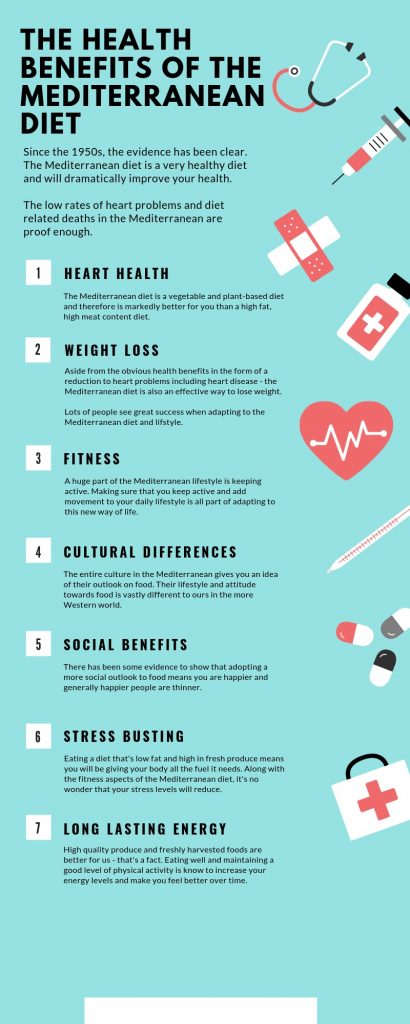Many people who have been following or thinking of following the very low carb Ketogenic diet for fat loss are now turning to the Ketogenic Mediterranean Diet. As you might imagine the diet is a combination of the Keto and Mediterranean diet.
Both the keto diet and the Mediterranean diet are effective for fat loss. The keto diet offers quicker initial weight loss but the Mediterranean diet has been shown to result in weight loss and numerous health improvements over a longer period.
Related reading: Everything You Need To Know To Lose Body Fat
Although there have not been any studies to date comparing the regular keto diet with the Ketogenic Mediterranean diet it likely that by combining the Keto with the Miditerranean diet you will get more health benefits than following one diet alone.
So, let’s take a closer look at the Ketogenic Mediterranean diet and uncover the main principles behind this diet plan. That way, you’d be able to determine if this diet can help you to effectively reach your weight loss goals.
What is the Mediterranean Diet?
The Mediterranean Diet consists of eating those foods that people from the Mediterranean region ate during the post World War 2 era. The studies are based on people from the countries of Italy and Greece.
According to the studies, these people are exceptionally healthy. They were found to have a lower risk of suffering from those diseases that are attributed to poor eating habits, despite limited access to modern healthcare.
The American Heart Association has noted that the diet consists of a good amount of healthy fats, which is also the case for the keto diet. According to them,
“More than half the fat calories in a Mediterranean diet come from monounsaturated fats (mainly from olive oil). Monounsaturated fat doesn’t raise blood cholesterol levels the way saturated fat does.”
Followers of the Mediterranean diet should focus on eating heart-healthy foods such as fruits, fish, beans, vegetables, olive oil, nuts, and high-fiber foods. Meats, cheeses, and sweets have to be limited.
What are the Benefits of the Mediterranean Diet?
Although the biggest benefit of the Mediterranean diet is fat loss, it can also help to lower your risk of various illnesses. The diet may also help to improve your mood and boost your overall energy level. Above all, it can help to keep your brain and heart healthy.
The Mediterranean Diet can benefit your heart and body by:
• Preventing heart diseases
• Lowering your risk of heart attack
• Lowering your cholesterol level
• Preventing diabetes
For the brain, the Mediterranean diet can:
• Prevent stroke
• Minimize the risk of Alzheimer’s disease and dementia
• Treat depression
• Prevent Parkinson’s Disease

Ketogenic Versus Mediterranean Diet
Before we find out what the Ketogenic Mediterranean diet is, let us first do a brief comparison of these two diets.
First of all, both the ketogenic diet and Mediterranean diet limits the intake of processed foods. Both diets promote eating healthier and minimally processed foods. These include fish, seafood, low-carb vegetables, and olive oil.
In a typical ketogenic diet, 70% of your diet must come from fats, 25% from protein, and only 5% from carbs. However, a Mediterranean diet consists of 50% carbs, 35% fat, and 15% protein.
Related reading: How Many Carbs Do You Need To Eat To Lose Weight?
As for the benefits, both diets are effective for fat loss and can result in a significant improvement in one’s overall health.
Related reading: 5 Good Keto Diet Tips To Follow Even If You’re Not On Keto
As you see, both diets have lots of similarities. One of the most obvious differences between the two is the amount of carbs that you’re allowed to consume.
While the keto diet limits the consumption of carbs to only 5%, fifty percent of the calories from the Mediterranean diet can come from carbs.
So, it’s safe to assume that the Mediterranean diet might be a better option for those who find it difficult to significantly lower their carb consumption.
What is a Ketogenic Mediterranean Diet?
Now that you understand the concept behind a Mediterranean Diet, let’s take a closer look at the Ketogenic Mediterranean diet and understand what this diet is all about.
In 2008, a group of researchers from Spain decided to explore the potential benefits of combining the ketogenic diet and the Mediterranean diet. The study is known as the “Spanish Ketogenic Mediterranean Diet”.
The study demonstrated changes that you can expect from following the standard ketogenic diet. These include a significant decrease in blood pressure level, body fat, and glucose. However, the biggest finding from this study has to do with the amount of cholesterol.
Related reading: 9 Proven Benefits Of A Ketogenic Lifestyle
The subjects of the study showed a significant decrease in LDL cholesterol and an increase in HDL. LDL, also known as the “bad cholesterol”, tends to accumulate in your blood vessels and could trigger a blockage.
Related reading: Doesn’t A High Fat Diet Clog Up Your Arteries?
On the other hand, the HDL is known as the “good cholesterol”, and helps to eliminate other cholesterol from the bloodstream. Having a higher level of HDL could lower your risk of heart-related diseases.
Related reading: How a Low Carb High Fat Diet Affects your Cholesterol
In the end, the researchers concluded that the unique combination of the Ketogenic Mediterranean Diet could be a safe, healthier, and effective way to lose weight.
How to Follow the Ketogenic Mediterranean Diet
The ketogenic Mediterranean diet sounds like a good diet to try, especially if you’re trying to lose weight. But how do you get started with it?
Here are the key characteristics of this diet plan:
· Restrict carbs to promote ketosis – you should lower your carb consumption to only 35 grams per day in order to induce your body into the state of ketosis. This can also help to lower your appetite and boost fat loss.
· Eat lots of monounsaturated and polyunsaturated fats – both diets promote eating lots of healthy fats. These should come from avocados, olive oil, nuts, seeds, etc.
· Include keto-friendly vegetables in your diet – try to eat as many leafy greens as possible. These veggies are loaded with vitamins and minerals that can help to improve your health.
Related reading: Boost Your Weight Loss Efforts With Veggies
· Eat lots of fresh fish and seafood – in keto, your protein sources can come from grass-fed meat including pork, beef, and poultry. But in the ketogenic Mediterranean diet, your protein sources should consist mainly of fresh fish and seafood.
Conclusion
The Ketogenic Mediterranean Diet appears to be a safe and effective way to promote fat loss while treating metabolic syndrome. For this reason, this diet might be a great option to try especially if you’re suffering from hypertension and diabetes and you want to lose weight.
Monitor your health during the first few months and be mindful of any changes. If you find that the diet plan is not effective or that it has done nothing to improve your health, then you might as well stick to the regular Mediterranean or Keto Diet, whichever is more sustainable for you in the long run.










